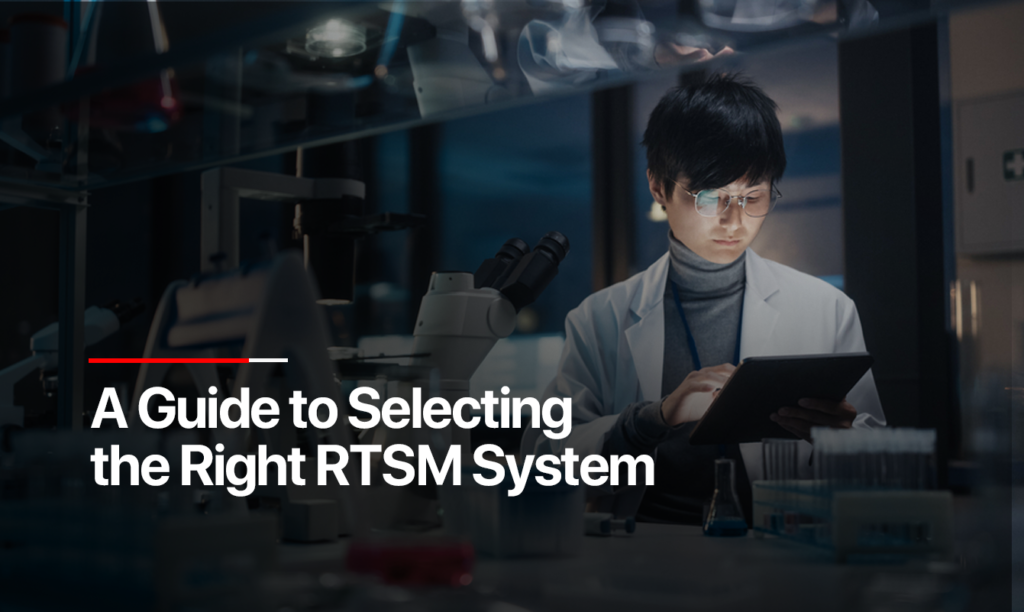Simplifying eCRFs: A Look at the Future of Clinical Data Management

Recent Articles AI-Powered Clinical Data Validation: Ensuring Accuracy, Efficiency, and Compliance September 21, 2024 Read More AI in Clinical Trials: Key to Accelerated Timelines & Reduced Costs July 29, 2024 Read More Simplifying eCRFs: A Look at the Future of Clinical Data Management July 8, 2024 Read More Simplifying eCRFs: A Look at the Future of Clinical Data Management Abriti Rai / July 08, 2024 The evolution of electronic case report forms (eCRF) is a remarkable progress in the clinical trials landscape. The transition from paper-based CRFs to eCRFs was driven by several factors, including the increasing complexity of clinical trial protocols, the need for greater efficiency in managing large volumes of trial data, and advancements in technology that supported digital solutions for data collection and management. The main objective of this shift was to obtain accuracy and speed in data collection, data validation, enhanced security, and the overall improvement of the clinical trials. As electronic case report forms (eCRFs) have continued to advance, they have adapted to the evolving trial requirements and contributed to the standardization of the data collection process. The Journey from Paper to Electronic Case Report Form (eCRF) Paper-based electronic case report forms (eCRF) need manual data entry, which often leads to transcription mistakes and illegible handwriting, compromising data quality. The need for physical transportation of forms caused significant delays in data processing, hindering timely decision-making. Managing paper forms is labor-intensive and resource-consuming, and they are vulnerable to damage, theft, and unauthorized access. In contrast, eCRFs bring numerous benefits and are the answer to the challenges faced by paper case report forms (CRFs). Built-in validation checks and standardized input fields reduce errors, ensuring more accurate data collection. Instant data entry and real-time access improve decision-making and trial efficiency. The elimination of paper reduces administrative costs and resource use. eCRFs ensure standardized data collection and regulatory compliance by incorporating various security measures such as encryption, role-based access control, and multifactor authentication to protect data integrity and confidentiality. Additionally, robust disaster recovery strategies are implemented to safeguard against data loss, which are essential features of modern eClinical systems. The Rise of Global Libraries and Built-in Compliance With the shift towards eCRFs, the industry is also embracing pre-built global libraries that streamline data collection, ensure regulatory compliance from the outset, and contain standardized data points adhering to CDASH guidelines. This eliminates the need to recreate forms from scratch for each study, saving time, ensuring consistency across trials, and expediting study initiation with compliance built right in. Gen AI and AIML Shaping the Future of eCRFs As mentioned before, Case report forms (CRFs) have evolved from paper forms to electronic forms to meet the changing needs of a clinical trial. But their transformation is still ongoing and the incorporation of Generative AI (Gen AI) and Artificial Intelligence/Machine Learning (AIML) plays a pivotal and game-changing role in further revolutionizing the effectiveness of electronic case report forms (eCRFs). The incorporation of AI and ML into eCRFs promises efficient and informative trials, reducing costs, expediting timelines, and ultimately increasing the likelihood of successful outcomes. Here’s a look at some exciting advancements on the horizon: Automate eCRF Creation GenAI streamlines electronic case report form (eCRF) creation by intelligently analyzing clinical trial protocols, leveraging pre-built global libraries of standardized data fields, and automatically drafting eCRFs. This reduces manual effort, minimizes errors, and saves time. Mapping of CDASH Annotations CDASH is a part of the CDISC initiative and guides eCRF development. By mapping CDASH annotations in eCRFs, researchers can ensure that the data is captured in the eCRFs with standardized CDASH terminologies. This, in turn, standardizes the collection, documentation, and reporting of the data and interoperability, thereby facilitating data sharing and regulatory compliance across the research community. Source Data Verification (SDV) AIML can be used in the electronic case report form (eCRF) system to ensure that the data collected for the trial is valid. Using AIML, the information collected from the participants for the clinical trials can be compared to the actual source. Any anomalies or inconsistencies in the data can then be detected. SDV is instrumental in upholding good clinical practice (GCP), which is extremely important for clinical research. Automate Query Generation The integration of Al with eCRFs helps in the detection of anomalies. However, it also automates query generation through alerts and notifications to the concerned personnel, which helps streamline the query resolution process and the optimization of trials. Transformative Leap of Electronic Case Report Forms (eCRFs) Integration with technologies such as Gen AI and AIML is leading us toward a new era of smart eCRFs to automate form creation, standardize data collection, verify data sources, and automate query generation. This demonstrates the potential that technology holds in influencing the future of data collection in clinical trials that translates to faster study setup, cleaner data, and ultimately, getting new treatments to patients quicker. Clinion: Advancing Streamlined eCRFs At Clinion, we are at the forefront of the eCRF revolution. We continuously innovate and develop new tools that leverage cutting-edge technology like global libraries, AIML, and GenAI. Our mission is to empower researchers with smarter electronic case report forms (eCRFs) that accelerate the development of life-saving treatments. Get in touch with our product experts today to learn more.
Clinical Data Management System (CDMS): Overcoming Challenges in the Age of AI

Recent Articles AI-Powered Clinical Data Validation: Ensuring Accuracy, Efficiency, and Compliance September 21, 2024 Read More AI in Clinical Trials: Key to Accelerated Timelines & Reduced Costs July 29, 2024 Read More Simplifying eCRFs: A Look at the Future of Clinical Data Management July 8, 2024 Read More Clinical Data Management System (CDMS): Overcoming Challenges in the Age of AI Rajesh S Pothula / June 1, 2024 One of the biggest challenges clinical data management faces is the sheer amount of data that needs to be processed. With more and more patient data becoming available, it can be difficult for CDM systems to keep up. In addition, many clinical data management systems (CDMS) are not user-friendly or interactive, making it difficult for users to get the most out of them. What challenges do clinical data management systems currently face? Automate eCRF Creation Clinical Trial Complexity The modern clinical trial design requires real-time data modelling and simulation to provide reliable information that supports faster decision-making and reduces development time, costs, and late-stage research failures. Nowadays, many clinical trials are considered adaptive, meaning that they can change as the trial progresses and that incoming data is used to determine the next steps. In such a scenario, if a patient does not react to a drug, it may be decided to change the drug or dosage. Some therapeutic areas and scenarios like immuno-oncology, and multi-arm trials also add new levels of complexity to clinical trials. The future of clinical data management lies in the ability to adapt to these changes and needs. In order to be truly effective, a clinical data management system (CDMS) must be able to handle large amounts of data, be user-friendly and utilise artificial intelligence to automate tedious manual tasks. Mid Study Changes Clinical Data Management is a complex process. It involves multiple stakeholders, from investigators to sponsors and CROs. This can make CDM challenging, especially when it comes to the mid-study changes (MSCs). Mid-study changes are amendments to protocols or study data management plans (SDMPs). Mid-study changes can be due to any or all of these reasons: Change in inclusion/exclusion criteria Change in dosage/frequency of drug administration Exclusion/inclusion of new patient subpopulations Inclusion/exclusion of new therapeutic agents/devices Change in primary outcome measure (PRO) or secondary outcome measures (SO). A study by Tufts says that approximately 70% of its respondents say unplanned mid-study changes are the primary reason for the trial delay. Planned changes can be even more challenging as they require extensive planning before going live so that they don’t interfere with ongoing trials or other projects. The changes needed during the study are a major challenge for CDM. Planned and unplanned mid-study changes are significant reasons for the trial delays. So a system that supports faster mid-study changes and which is very easy to use and faster to go live is the need of the hour. The clinical data management system (CDMS) should be able to handle all the required changes in a single place instead of going through multiple systems to make changes. Addressing Clinical Data Management Challenges Using AI With the increasing complexity and volume of data, traditional data management methods involving human resources are proving inefficient. The lack of skilled professionals further adds to the shift. This is where AI steps in and plays a crucial role in the management of high-volume data, particularly in adaptive trials by: Data ingestion Data analysis Data cleaning With data cleaning and review processes, AI greatly improves clinical data management, reducing manual effort and increasing efficiency. AI helps quickly identify critical and abnormal data by detecting risks and trends early. With minimized biases and inconsistencies caused by manual work, AI also improves data accuracy and quality. Clinical Data managers can now do better resource allocation and focus on critical tasks to speed up the clinical trial lifecycle The Evolving Role of Clinical Data Managers Clinical data management has come a long way in the last few decades. What once started out as a small department within a clinical research organisation has now become a critical and highly specialised function. In the past, clinical data managers were responsible for data entry and cleaning. In the late 90s, the role of clinical data management (CDM) began to change as electronic data capture (EDC) came into the picture. The CDM became responsible for configuring the EDC system and creating and managing data queries. Today, clinical data managers are responsible for developing and implementing data management plans, ensuring data accuracy and completeness, and ensuring data security. With these responsibilities, it is also important for clinical data managers to up their game with AI/ML skills. Managing a high amount of data could use the help of intelligent technologies like AI/ML which could change the game. What is the future of clinical data management? Data integrity, transparency, and efficiency are crucial for a successful clinical data management system. To achieve these objectives, it is essential to establish clear guidelines for data ownership and sharing, standardize data formats, and leverage cutting-edge technologies such as generative AI. Clear policies and regulations for patient information ownership and data sharing are crucial for the future of clinical data management. Standardization of formats for storing patient information and trial-related documents will help prevent ambiguity about ownership and access. Automation of clinical data management tasks, including the use of generative AI to analyze data, will accelerate drug development. Clinical data management roles are evolving to require expertise in data science and analytics to handle large volumes of data. CDMS systems need to integrate with Gen AI tools to automate tasks and improve data quality. In conclusion, ensuring effective clinical data management requires a commitment to innovation and continuous improvement. Embracing advanced technologies and evolving expertise will drive future success and efficiency in the field. See How An AI-enabled Clinical Data Management Software can Supercharge Your Clinical Trials? Contact Us
A Guide to Selecting the Right Randomization and Trial Supply Management (RTSM) System

Recent Articles AI-Powered Clinical Data Validation: Ensuring Accuracy, Efficiency, and Compliance September 21, 2024 Read More AI in Clinical Trials: Key to Accelerated Timelines & Reduced Costs July 29, 2024 Read More Simplifying eCRFs: A Look at the Future of Clinical Data Management July 8, 2024 Read More A Guide to Selecting the Right Randomization and Trial Supply Management (RTSM) System Clinion Team / June 17 2024 Randomization and Trial Supply Management (RTSM) plays a key role in the success of a clinical trial by ensuring accurate patient randomization, minimizing investigational product (IP) wastage, and upholding data integrity. Understanding the safety, efficacy, and correct therapeutic dose of an investigational treatment is fundamental to achieving these goals. Choosing the right RTSM partner goes beyond meeting the basic functionalities. The ideal RTSM partner will enhance the speed and accuracy of clinical trials and provide expert guidance on the implementation. With various RTSM systems available, it is crucial to select the one that evolves with the changing requirements of clinical trials. A Guide To Choosing The Right RTSM Partner Rapid Deployment An RTSM system that takes weeks to deploy isn’t ideal for the current age clinical trials. The ideal RTSM should be deployable within days, allowing trials to start promptly and run smoothly. Quick deployment is essential for maintaining project timelines, reducing costs, and ensuring trials start promptly. 100% Configurable System The ideal RTSM should be fully configurable and intuitive. Configurable systems can easily accommodate protocol amendments, various randomization schemes, and diverse trial designs by eliminating the need for complex coding and significantly reducing setup time. A highly configurable system is adaptable and efficient, capable of accommodating most clinical trials without extensive customization. Powerful Integration A robust RTSM system should offer powerful integration capabilities to ensure seamless interoperability with clinical trial systems like EDC, CTMS, and ePRO. These integrations allows real-time data transfer across systems, minimizing errors, eliminating the need of data reconciliation, enhancing data accuracy, and optimizing operational efficiency. By facilitating a unified workflow and reducing manual interventions, a well-integrated RTSM system empowers clinical trials to achieve accurate and reliable outcomes. Adaptive Trial Facilitation When selecting an RTSM system, prioritize one that supports the dynamic needs of adaptive trials. An ideal RTSM should enable mid-study changes with ease, such as modify randomization procedures, subject replacement, dosage modifications, sample size adjustments, and trial design alterations. Additionally, in emergencies, the system should offer support for unblinding to maintain the trial’s integrity and continuity. A well-equipped RTSM system with robust adaptive trial capabilities ensures greater flexibility, allowing clinical trials to navigate evolving requirements and achieve reliable, efficient outcomes. Support Complex Protocols To support complex clinical trial protocols effectively, an RTSM system should be versatile and adaptable. It must accommodate various study designs, including crossover, sequencing, and extension studies, ensuring it meets the unique needs of each trial. The system should also offer robust cohort management capabilities and a range of randomization options, such as static, stratified, dynamic, forced, and adaptive, to provide tailored support for complex trial protocols. This ensures the system can maintain trial integrity and deliver accurate, reliable results. IP Monitoring and Tracking An ideal RTSM system should provide comprehensive monitoring and tracking of investigational product (IP) inventory. It is essential for strategic planning and distribution, ensuring inventory levels at each trial site remain adequate. The system should also track patient registrations and IP quantities across trial centers to prevent shortages. Additionally, the RTSM should promptly alert when inventory levels fall below a threshold, facilitating timely restocking from the depot. This ensures smooth trial operations and minimizes disruptions in treatment delivery. Adherence to Regulatory Standards and Guidelines The RTSM system that you are choosing should comply with industry standards such as 21 CFR Part 11, GDPR, and EU Annex 11. If it’s being operated in multiple countries then the system should comply with the local regulations as well. Also, the data security should be robust and the system should have a disaster recovery plan in place to ensure continuation of trials even under unforeseen circumstances. Conclusion By carefully evaluating these factors, you can select an RTSM system that optimizes your clinical trials, safeguards data integrity, and ultimately contributes to faster development of life-saving treatments. Clinion’s RTSM system addresses these challenges head-on. Built for rapid deployment and seamless integration, it empowers researchers to navigate the complexities of clinical trials with confidence. Clinion’s system offers the flexibility to handle even the most intricate studies, ensuring data integrity and efficient resource management. By partnering with Clinion, you can ensure your research is conducted with the highest standards, paving the way for faster, more reliable medical breakthroughs. See How our Clinion RTSM can Accelerate your Clinical Trials! Schedule Demo
How Clinion Expedited Immunization Trials During Pandemic

Recent Articles AI-Powered Clinical Data Validation: Ensuring Accuracy, Efficiency, and Compliance September 21, 2024 Read More AI in Clinical Trials: Key to Accelerated Timelines & Reduced Costs July 29, 2024 Read More Simplifying eCRFs: A Look at the Future of Clinical Data Management July 8, 2024 Read More How Clinion Expedited Immunization Trials During Pandemic Clinion Team / June 17 2024 Problem Statement In 2020, the global landscape changed dramatically with the advent of COVID-19. The fatal virus strain soon infected millions of people worldwide, forcing everyone to live a masked life that became limited to their homes. Bharat Biotech is one of India’s leading Biotech companies and when India got hit by the COVID-19 pandemic, the company started looking for a proven and easy-to-use system that could accelerate COVID vaccine trials. Bharat Biotech’s Covaxin, one of the first COVID-19 vaccines developed by an Indian company, was approved to enter Phase 1 and 2 of clinical trials by the Drugs Controller General of India in 2020. The company had very aggressive timelines to meet, and the Indian government, along with an entire nation, were eager to see how soon the vaccine could be tested and made available to the public. The studies were scheduled to go live in less than two weeks. The challenges were: Study set up Time frame Less time for training and onboarding Bharat Biotech approached Clinion as they wanted a robust and easy to use platform which has a reputation for quick and seamless study setup without compromising on the quality and safety. Solution Clinion is a leading clinical trial technology provider offering the benefits of EDC, RTSM, CTSM, eCOA, medical coding and document automation in a single platform. Because of Clinion’s proven record of rapid deployment for even complex studies and very intuitive and easy to use interface, Clinion became the first choice for Bharat Biotech for its super critical Covid-19 phase I/II vaccine trials. The Clinion EDC and RTSM were successfully deployed in the two-week time frame as requested by Bharat Biotech. Training the external CRO and Bharat Biotech’s internal operations and data management teams was also completed within the agreed timelines. FPI was achieved in less than three weeks from initiation, with minimal post production issues. Clinion ensured seamless integration between Clinion EDC & RTSM (Randomization & Trial Supply Management) to ensure reduced randomization and supply issues during this highly critical trial. Achievements Clinion enabled the very first COVID-19 Phase I/II study to go online and have the FPI in less than 3 weeks. The Clinion EDC and RTSM were successfully deployed in the two-week time frame as requested by Bharat Biotech. Clinion supported the trial which was spread across 3 phases Clinion also provided round-the-clock support to ensure smooth execution of the trials. The client was able to submit the data for interim analysis and approval and obtain approvals for phase III in less than 6 months from trial initiation. The success of this study and the speed at which Clinion was able to set up and deploy the study encouraged Bharat Biotech to entrust six more vaccine studies to Clinion Conclusion Bharat Biotech was able to launch Covaxin during the pandemic within a year of starting the trials. The launch of Covaxin helped curb the impact of COVID-19 to a great extent. Clinion stepped up to the need of the hour…. Clinion’s end-to-end integrated platform minimized manual labour and sped up the process. What takes 4-5 years of time, was accomplished in 1 year! Bharat Biotech partnered with Clinion and conducted more than 14 vaccine trials during the pandemic and after.
Clinion Soars to the top Spot on G2 with 8 Badges!

Recent Articles AI-Powered Clinical Data Validation: Ensuring Accuracy, Efficiency, and Compliance September 21, 2024 Read More AI in Clinical Trials: Key to Accelerated Timelines & Reduced Costs July 29, 2024 Read More Simplifying eCRFs: A Look at the Future of Clinical Data Management July 8, 2024 Read More Clinion Soars to the top Spot on G2 with 8 Badges! Clinion Team / June 17 2024 Clinion kicked off 2024 with a roaring start, securing an impressive 8 new G2 badges in the winter 2024 ratings! This builds upon our Fall 2023 recognition, extending our lead in the EDC category and solidifying our position as market leaders.These prestigious badges – hallmarks of User Satisfaction, Ease of Use, and Innovation – translate to millions of happy users and streamlined trials. Experience the next generation of clinical trials with Clinion.

